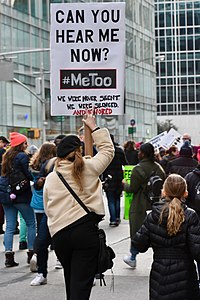
Photo from wikipedia
The focal article by Medeiros and Griffith (2019) raises important points about the challenges of developing and evaluating effective sexual harassment training. However, one area that remains largely neglected by… Click to show full abstract
The focal article by Medeiros and Griffith (2019) raises important points about the challenges of developing and evaluating effective sexual harassment training. However, one area that remains largely neglected by current research and practice in this area is sexual harassment and teenage workers. Although the focal article addresses training for college-age students, such training is largely focused on preventing sexual assault or acquaintance rape by fellow students rather than on sexual harassment in an employment context. Like adults, working adolescents are protected from sex discrimination, including sexual harassment, by Title VII of the 1964 Civil Rights Act. Moreover, there are important reasons why we believe that teenage workers deserve special attention when it comes to sexual harassment training. First, they are often perceived as easy targets for sexual harassment; that is, they are workers who are young, typically unmarried, often work part time, have low seniority status, and are regular users of social media where sexual comments and requests are frequently made. Second, research demonstrates that the psychological security and physical safety of these young people may be at risk (e.g., Chiodo, Wolfe, Crooks, Hughes & Jaffe, 2009; Gruber & Fineran, 2016). Third, the number of lawsuits filed by young workers is rising (EEOC, 2017a). In response to this growing trend and concern, the Equal Employment Opportunity Commission (EEOC) has even developed a webpage, Youth@Work, dedicated to teenage workers (EEOC, 2017b). Finally, often employers do not pay enough attention to the fact that teenage workers are different from adult employees in terms of education, experience, sophistication, cognitive and moral development, and vulnerability, and employers do not tailor their adult-oriented workplace policies and practices to account for these differences (Bible, 2008). Thus, the sexual harassment of teenage workers in employment (rather than university) contexts is one that needs to be addressed further, particularly in terms of training interventions.
Journal Title: Industrial and Organizational Psychology
Year Published: 2019
Link to full text (if available)
Share on Social Media: Sign Up to like & get
recommendations!